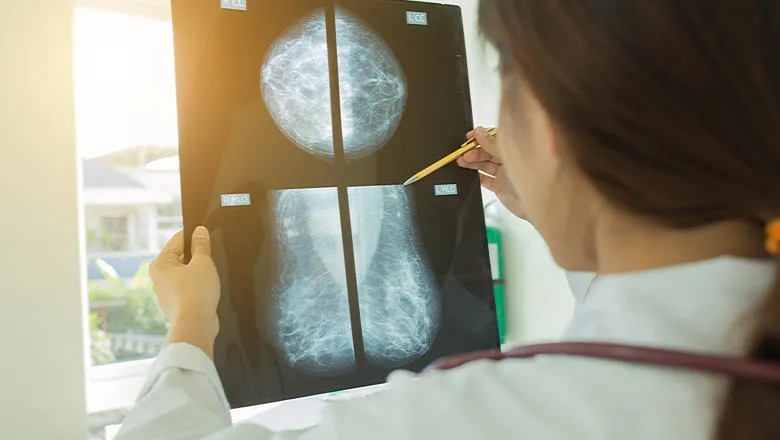Anti-HER2 therapies are a class of medicines used to treat all stages of HER2-positive breast cancer, from early-stage to metastatic. HER2 evaluation is a complex and evolving field.
Dr Sheeba Irshad, a clinician from the School of Cancer & Pharmaceutical Sciences
19 January 2022
AI tool in development to combat aggressive breast cancer
Researchers from King’s and Guy’s and St Thomas’ Foundation Trust are developing an AI model to speed up the diagnosis of one of the most aggressive forms of breast cancer.

The partnership with software company Owkin is developing deep learning models to predict patients whose breast cancer tests positive for a gene called HER2, a signature that plays an important role in the progression of aggressive forms of breast cancer.
Nearly a quarter of all breast cancer cases are HER2-positive breast cancer, affecting up to 14,000 women in Britain every year. This type of cancer is more responsive to certain treatments.
It is hoped that using AI will allow quick and accurate assessment of the presence of HER2, ensuring the thousands of women who are diagnosed with HER2-positive breast cancer every year receive targeted treatment as soon as possible.
The use of anti-HER2 therapies has dramatically improved survival rates for breast cancer patients. However, accurately assessing HER2 levels involves careful analysis by specialised pathologists. At present, pathologists analyse tissue sample slides to detect the presence of HER2 proteins.
The new AI models will be ‘trained’ on hundreds of historical tissue samples from consenting breast cancer patients at Guy’s and St Thomas’. Although this project is in its early stages, it is hoped that this will help the system detect the over-expression of HER2.
She added: “This is an exciting partnership between Owkin, King’s College London and Guy’s and St Thomas’ to help understand if artificial intelligence methods such as deep learning algorithms have the potential to facilitate clinical decision making in the breast cancer patient pathway.”
Thomas Clozel, Co-Founder and CEO of Owkin and former clinical onco-hematologist, said: “While breast cancer treatment has been transformed in recent decades, the disease still takes three quarter of a million lives every year. By using AI to better spot some of the most aggressive forms of the cancer, it has the potential to radically improve outcomes for patients across the NHS and beyond.”
